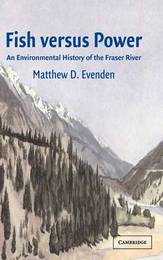
|
Fish versus Power: An Environmental History of the Fraser River
Hardback
Main Details
| Title |
Fish versus Power: An Environmental History of the Fraser River
|
| Authors and Contributors |
By (author) Matthew D. Evenden
|
| Series | Studies in Environment and History |
|---|
| Physical Properties |
| Format:Hardback | | Pages:328 | | Dimensions(mm): Height 229,Width 152 |
|
| Category/Genre | Management of land and natural resources
Environmental science, engineering and technology |
|---|
| ISBN/Barcode |
9780521830997
|
| Classifications | Dewey:333.95616097113 333.95/616/097113 333.7845097113 |
|---|
| Audience | | Professional & Vocational | | Tertiary Education (US: College) | |
|---|
| Illustrations |
5 Tables, unspecified; 10 Maps; 7 Halftones, unspecified; 3 Line drawings, unspecified
|
|
Publishing Details |
| Publisher |
Cambridge University Press
|
| Imprint |
Cambridge University Press
|
| Publication Date |
3 May 2004 |
| Publication Country |
United Kingdom
|
Description
Fish versus Power is an environmental history of the Fraser River (British Columbia) and the attempts to dam it for power and to defend it for salmon. Amid contemporary debates over large dam development and declines in fisheries, this book offers a case study of a river basin where development decisions did not ultimately dam the river, but rather conserved its salmon. Although the case is local, its implications are global as Evenden explores the transnational forces that shaped the river, the changing knowledge and practices of science, and the role of environmental change in shaping environmental debate. The Fraser is the world's most productive salmon river; it is also a large river with enormous waterpower potential. Very few rivers in the developed world have remained undammed. On the Fraser, however, fish - not dams - triumphed, and this book seeks to explain why.
Reviews"Evenden approaches the story of hydroelectric power from a fresh angle. [...] Unlike many other environemtnal histories, Evenden's book offers a relatively hopeful tale, one where a balance between technological progress and preservation is struck." National Post, Canada
|